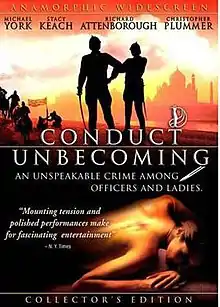| Conduct Unbecoming | |
|---|---|
 DVD Cover | |
| Directed by | Michael Anderson |
| Written by | Robert Enders |
| Based on | Conduct Unbecoming by Barry England |
| Produced by | Michael Deeley Andrew Donally Barry Spikings |
| Starring | Michael York Richard Attenborough Trevor Howard Stacy Keach Christopher Plummer Susannah York |
| Cinematography | Robert Huke |
| Edited by | John Glen |
| Music by | Stanley Myers |
Production company | |
| Distributed by | British Lion |
Release date |
|
Running time | 108 minutes |
| Country | United Kingdom |
| Language | English |
Conduct Unbecoming is a 1975 British period legal drama film directed by Michael Anderson and adapted by Robert Enders from Barry England's play of the same name. It features an ensemble cast, starring Michael York, Richard Attenborough, Trevor Howard, Stacy Keach, Christopher Plummer and Susannah York. Set in a British Indian Army barracks in the late 19th-century, the film centers on an impromptu court-martial following the assault of an officer's widow.
Conduct Unbecoming was released by British Lion Films on October 5, 1975, to generally positive reviews. The American National Board of Review ranked the film in its Top Ten Films of 1975.
Plot
In 1880, two young British officers arrive to join a regiment in India. One, 2nd Lieutenant Arthur Drake, from a middle-class background, is extremely eager to fit in while the other, 2nd Lieutenant Edward Millington, the son of a general, is keen to get out as soon as possible and deliberately antagonizes his fellow officers. The two newcomers learn the traditions of the regiment, one of which is a mess game in which they chase a wooden pig on wheels, attempting to pierce its anus with their swords.
Mrs. Marjorie Scarlett, the flirtatious and attractive widow of a captain who was posthumously awarded the Victoria Cross, is a constant presence in the regiment. One night at a mess dance, Millington gets drunk and tries to seduce Mrs. Scarlett in the garden. She repels him, but moments later runs back into the mess wounded and in shock, claiming the culprit was Millington. An informal court martial – more a mock trial than anything else – is organised with Drake ordered to be Millington's defending officer.
Although Drake is pressured by his superior officer to plead guilty for Millington and close the case quickly, he begins to challenge the orders in order to give the defendant a fair trial. Drake learns from an Indian servant that another widow suffered a similar attack with a sword six months earlier, before he and Millington joined. After irrefutable evidence, Mrs. Scarlett finally admits it was not Millington who attacked her but will not say who the culprit is.
Millington, now indisputably proved innocent, is welcomed back by his brother officers; but Drake, disgusted by the truth he's uncovered, resigns. One officer knows who the culprit is and, hiding Drake in the shadows so he may witness what is to take place, confronts the guilty man privately in the final scene.
Cast
- Michael York as 2Lt. Lieutenant Arthur E. Drake
- Richard Attenborough as Maj. Lionel E. Roach
- Trevor Howard as Col. Benjamin Strang
- Stacy Keach as Capt. Stuart Harper
- Christopher Plummer as Maj. Alastair Wimbourne
- Susannah York as Mrs. Marjorie Scarlett
- James Faulkner as 2Lt. Edward Millington
- James Donald as the doctor
- Rafiq Anwar as Pradah Singh
- Helen Cherry as Mrs. Strang
- Michael Culver as Lt. Richard Fothergill
- Persis Khambatta as Mrs. Bandanai
- Michael Byrne as 2Lt. Toby Strang
- Michael Fleming as Lt. Frank Hart
- David Robb as 2Lt. Winters
- David Purcell as 2Lt. Boulton
- Andrew Lodge as 2Lt. Hutton
- David Neville as 2Lt. Truly
- Jamila Massey as Servant
Production
Barry England's play premiered in 1969 and had a short run on Broadway the following year.[1]
The film was greenlit by Michael Deeley who had recently become managing director of British Lion Films, and was part financed through a US tax deal. Deeley said there had been a number of screenplays written, including one by Terence Rattigan which Deeley says cost £250,000. He said all of them "failed to crack the adaptation" but there was "a very simple solution, which was to go back to the stage play and strip out as much extraneous dialogue as possible. Robert Enders delivered a perfect screenplay by these means."[2]
Deeley hired Michael Anderson to direct, in part because he was efficient, and the film was shot at Shepperton Studios over four weeks starting mid November 1974. This meant the filmmakers have five weeks before the studio shut down over Christmas. Deeley says "the picture ran like clockwork".[3] The veteran Elizabeth Haffenden designed the costumes in her final film production.
Reception
Deeley says the film was "well made, at the right price and completely fulfilling British Lion's objective – to make money".[4]
Film critic John Simon wrote – "Conduct Unbecoming can be viewed with modest pleasure if only for its performances and the cinematography of Bob Huke".[5]
The American National Board of Review ranked the film in its Top Ten Films of 1975.
References
- ↑ News of the Rialto: 'Conduct Unbecoming' Is Coming On the Rialto: 'Conduct Unbecoming' Is Coming By LEWIS FUNKE. New York Times 31 May 1970: 61.
- ↑ Deeley p 107
- ↑ Deeley p 108
- ↑ Deeley p 108
- ↑ Simon, John (1983). John Simon: Something to Declare Twelve Years Of Films From Abroad. Clarkson N. Potter Inc. p. 220.
Notes
- Deeley, Michael (2009). Blade runners, deer hunters and blowing the bloody doors off : my life in cult movies. Pegasus Books. ISBN 9781605980386.